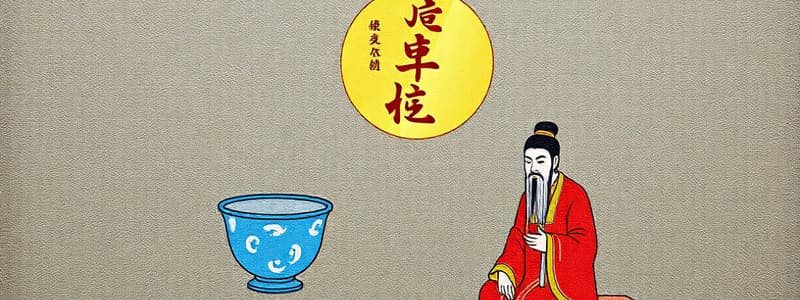Podcast
Questions and Answers
What are the five key relationships emphasized in Confucianism for creating societal harmony?
What are the five key relationships emphasized in Confucianism for creating societal harmony?
Father and son, brother and brother, husband and wife, ruler and subjects, friend and friend.
Explain the significance of filial piety in Confucian belief.
Explain the significance of filial piety in Confucian belief.
Filial piety is the respect for parents and is considered the most important virtue; it ensures that all aspects of life will align if upheld.
What is the main philosophical focus of Confucius's teachings compared to that of Lao Zi in Taoism?
What is the main philosophical focus of Confucius's teachings compared to that of Lao Zi in Taoism?
Confucius focused on ethical behavior and societal roles, while Lao Zi's teachings emphasized the way of the universe and spiritual aspects.
Identify and describe two key virtues from Confucianism and their relevance.
Identify and describe two key virtues from Confucianism and their relevance.
What irony surrounds Confucius's life regarding the spread of his teachings?
What irony surrounds Confucius's life regarding the spread of his teachings?
Flashcards
Confucianism
Confucianism
An ancient Chinese belief system emphasizing personal ethics, morality, and ancestor worship for a peaceful life.
Confucius
Confucius
Founder of Confucianism, a philosopher and teacher (551-479 BCE) whose teachings are written in books.
Filial Piety
Filial Piety
Respect for parents in Confucianism; considered the most important virtue.
Li (Confucianism)
Li (Confucianism)
Signup and view all the flashcards
Jen (Confucianism)
Jen (Confucianism)
Signup and view all the flashcards
Study Notes
Confucianism
- Ancient Chinese belief system emphasizing personal ethics and morality.
- Focuses on ancestor worship and human-centered virtues for a peaceful life.
- Golden Rule: "Do not do unto others what you would not want others to do unto you."
- Also known as "the school of the scholars."
- Founded by Confucius (551-479 BCE).
- An itinerant philosopher and teacher.
- His teachings, recorded by disciples, cover ethics, good behavior, and morality.
- Social harmony achieved through defined social roles.
- Father and son
- Brother and brother
- Husband and wife
- Ruler and subjects
- Friend and friend
- Filial piety (respect for parents) is paramount.
- Key beliefs:
- Li (ritual, propriety, etiquette)
- Hsiao (love within family)
- Yi (righteousness)
- Xin (honesty, trustworthiness)
- Jen (benevolence, humaneness)
- Chung (loyalty to the state)
Taoism (Daoism)
- Chinese religion and philosophy.
- Also known as Daoism.
- 'Tao' (Dao) means "way" - the way of the universe.
- Based on teachings of Lao Zi (Lao Tzu), considered a great sage.
- Focuses on the mundane world (Confucianism) and the metaphysical realm, mysticism, and harmony with nature.
- One's life becomes harmonious by yielding to the flow of Dao.
- Emphasizes "Wu Wei" (non-action or non-purposiveness) to achieve natural simplicity in life.
- The Dao De Jing (Tao Te Ching): 81 poems with 5,250 Chinese characters; considered the second most translated book into English after the Bible.
- Dao (Truth, Absolute, Nature, The Way of Nature, The Way) is central and paradoxical;
- Dao is the Ultimate Reality that governs everything, often linked to Nature.
- Dao is the way to reach the Ultimate Reality.
- Dao is only reached by observing the Way of nature or the laws of morality.
- Lao Zi (Old Master) is a historical figure, but his life is shrouded in mystery and is often considered a myth.
Studying That Suits You
Use AI to generate personalized quizzes and flashcards to suit your learning preferences.




